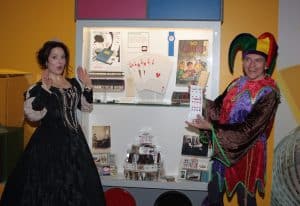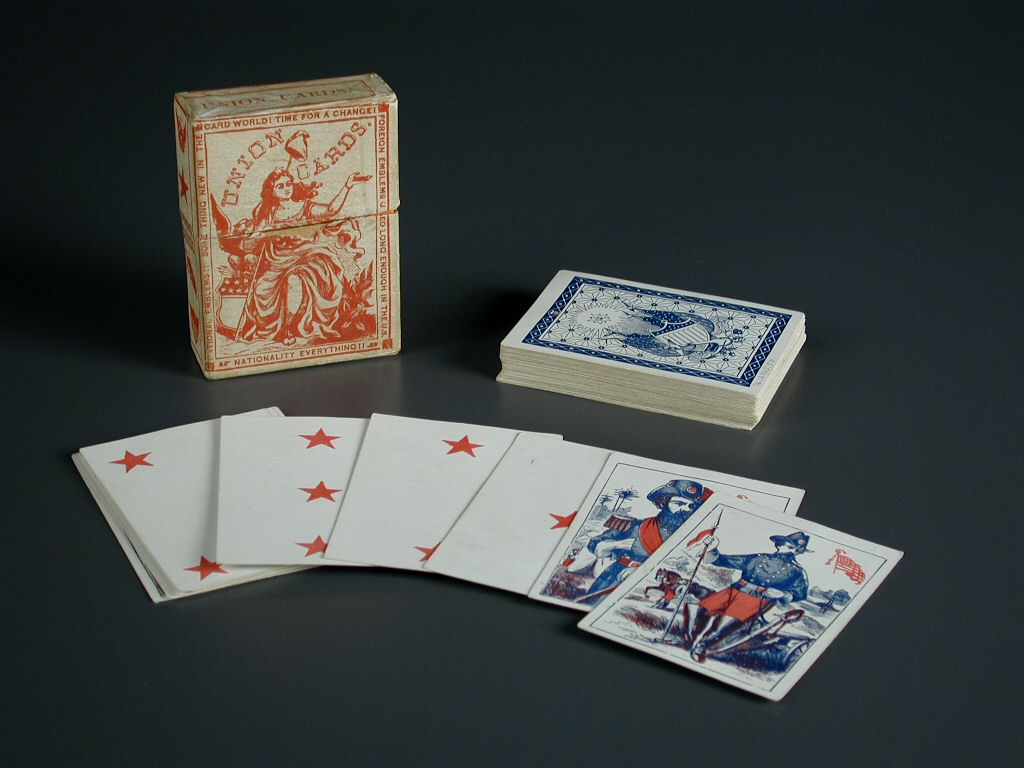 Playing cards are truly ancient game-playing devices. Their earliest origins are traced to ninth-century China, where people marked leaves with symbols and spots for game play. Most scholars believe that similar handmade playthings also appeared in Egypt and India. In Europe, the first handmade cards showed up during the 1300s, but printed decks arrived in Germany with the development of printing itself in the mid-1400s. The decks we recognize today came directly from England with the first colonists. After the Revolution, Americans began to produce their own decks based on these English designs.
Playing cards are truly ancient game-playing devices. Their earliest origins are traced to ninth-century China, where people marked leaves with symbols and spots for game play. Most scholars believe that similar handmade playthings also appeared in Egypt and India. In Europe, the first handmade cards showed up during the 1300s, but printed decks arrived in Germany with the development of printing itself in the mid-1400s. The decks we recognize today came directly from England with the first colonists. After the Revolution, Americans began to produce their own decks based on these English designs.
 Through the years, manufacturers tried to Americanize card decks—changing kings and queens to more patriotic images. They experimented with differently shaped cards; one cannot bend a corner on a round card. The popularity of certain games—bridge for one—made double decks of narrower cards popular. And today we see a resurgence of poker, especially televised Texas Hold’em games. Everyone recognizes playing cards and card games. Take a look around—you’ll see familiar card images everywhere, from television advertisements to movie clips to card tricks. But whether playing solitaire on your desktop or building a house of cards with your two-year-old, the experience of playing with cards as well as the look of playing cards haven’t changed much in 200 years.
Through the years, manufacturers tried to Americanize card decks—changing kings and queens to more patriotic images. They experimented with differently shaped cards; one cannot bend a corner on a round card. The popularity of certain games—bridge for one—made double decks of narrower cards popular. And today we see a resurgence of poker, especially televised Texas Hold’em games. Everyone recognizes playing cards and card games. Take a look around—you’ll see familiar card images everywhere, from television advertisements to movie clips to card tricks. But whether playing solitaire on your desktop or building a house of cards with your two-year-old, the experience of playing with cards as well as the look of playing cards haven’t changed much in 200 years.
What games do you remember playing as a child? Do you have a favorite game today? Names of card games, as well as types of games, differ by locality. For example, the card game euchre is particularly popular in Western New York and throughout the Midwest and Ontario. It was first introduced by the Pennsylvania German community. But there are regional differences in euchre’s rules, just as occurs in nearly every other card game. There are countless other children’s games, adult games, and games the whole family enjoys; as well as war games, sports games, and even magic tricks with cards. Cards help us pass the time, and they encourage social interaction and friendly competition. In short—they are made for play. Having a party or a family gathering? Spend it with a deck of cards!
 Hours 10 a.m.–5 p.m. | Fri. & Sat. till 8 p.m.
Hours 10 a.m.–5 p.m. | Fri. & Sat. till 8 p.m.